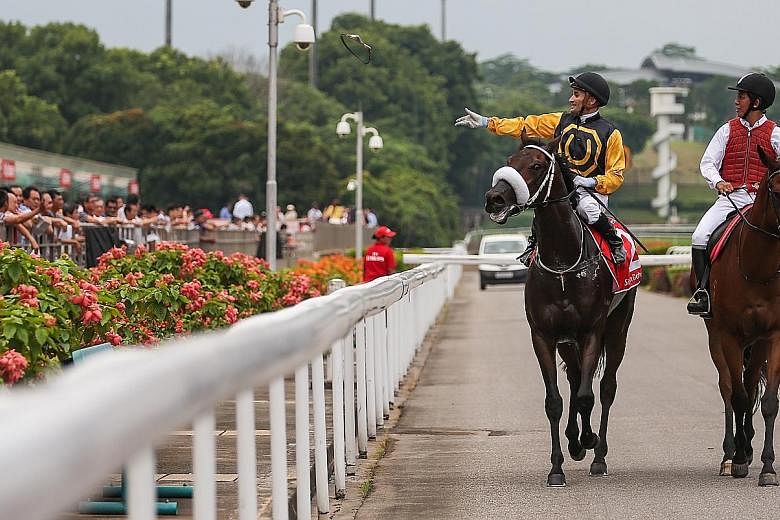It is the oldest horse race and the second-richest event on the local calendar but Sunday's Emirates Singapore Derby will be held against a much-changed backdrop for the racing industry.
The $1.15 million race, alongside November's $1.35 million Longines Singapore Gold Cup, are the only million-dollar races on the local calendar after last year's discontinuation of the globally renowned Singapore Airlines International Cup and KrisFlyer International Sprint, with prize money of $3 million and $1 million respectively.
The Singapore Turf Club's (STC) total turnover for 2014-15 was $1.453 billion, down from the previous year's $1.545 billion. Surplus fell from $16 million to $3 million in that period. Part of this can be attributed to fewer races. In 2013, there were 98 race meetings at the Kranji Racecourse, but there are only 91 scheduled for this season.
Yet this downturn mirrors the worldwide trend that has plagued the racing industry.
In the United States, wagering in 2014 was US$11.1 billion (S$14.95 billion), down almost US$5 billion from 2003 - according to racing statistics company Equibase - as crowd attendances fell sharply and famous racetracks like Hollywood Park and Suffolk Downs closed.
Even Hong Kong, seen as the epicentre of the sport in Asia, will experience its first drop in a decade. Its turnover grew from HK$59 billion (S$10.24 billion) in 2005-06 to HK$105.4 billion last season but will dip by one per cent this term, Hong Kong Jockey Club's chief executive officer Winfried Engelbrecht-Bresges told The Straits Times.
One factor has been the global economic uncertainty but the universal popularity of football and the rise of football betting has also offered significant competition to horse racing in many countries.
Between 2008 and 2015, turnover from off-site betting on horse racing fell £1 billion (S$1.75 billion) from roughly £5.74bn to £4.75bn, noted the United Kingdom's Gambling Commission. Meanwhile, football betting jumped by a third in the same period, from £941 million to £1.26 billion.
The proliferation of unauthorised online bookmakers has also become a major threat to their bottom line, said Engelbrecht-Bresges. "There's been a shift in betting to e-platforms and Asia has become a major hub for the illegal market."
Nevertheless, it is a highly lucrative sector that cannot be ignored. Ninety-six per cent of Singapore households access the Internet through their mobile devices and three-quarters of those over the age of 50 do so via mobile devices.
According to the National Council on Problem Gambling's 2014 survey, one in two in this latter group gambled - defined as participating in at least one form of gambling activity like Toto, 4D and betting in the past 12 months.
Both Singapore Pools and the STC applied last year for exemption under the Remote Gambling Act - passed in October 2014 to clamp down on unregulated online betting - and are waiting for approval.
With the exemption, it will "increase the number of punters and possibly the frequency of bets and the amounts wagered" and boost revenue, said Hannah Lim, associate professor of business law at Nanyang Technological University's Nanyang Business School.
Further savings could come from reducing the number of operating outlets necessary and the manpower required to run them, she added.
The Republic's strict rules are a sharp contrast to Hong Kong, said Engelbrecht-Bresges. "We promote horse racing as not just a sport but also as an entertainment and lifestyle experience and have been successful with that. But your government's restrictions make it very difficult to even advertise."
As a result, it is hard to change the stigma of horse racing among locals. While horse ownership is regarded as prestigious overseas - ex-Manchester United manager Alex Ferguson and film director Steven Spielberg own thoroughbreds - it lacks similar pull here.
The domestic racehorse population is about 1,400 with Singaporeans comprising about 60 per cent of owners - according to last year's figures - but many do not want their names associated with the horses and some even register their wives' names instead.
Horse racing may be the sport of kings but it struggles to attract younger audiences - punters at the STC are predominantly male and middle-aged - who are drawn to mainstream sports like football or trendy ones like mixed martial arts.
Leading local trainer Alwin Tan, who heads this season's premiership, said: "The crowds are getting older and the numbers are falling. A lot of the young owners, those in the 30s, are usually sons and daughters who are brought in by their parents. It's a tough business."
The STC has launched several initiatives over the years to raise interest - starting a racing trust (a group ownership scheme), offering rebates, working with the Singapore Tourism Board to bring in corporate business travelers - which have met with varying success.
But it remains undeterred. Its spokesperson said: "With a rich history of close to 175 years, horse racing is part of Singapore's heritage and we are confident it will continue to be relevant for years to come."
After all, horse racing can be used as a vehicle to promote a country's international brand, particularly for a financial hub like Singapore.
The Dubai World Cup began in 1996 and is now an iconic race. The city welcomes a million sports fans annually with a gross expenditure of more than US$1.7 billion, said a Deloitte report last year.
The Dubai Racing Club's executive director of racing Frank Gabriel Jr said: "Much of this success was due to the World Cup. It kick-started Dubai's reputation as a international sports destination."
The loss of the SIA Cup and KrisFlyer Sprint, both International Group 1 races, are setbacks for not just Singapore but the sport as a whole, said Engelbrecht-Bresges.
"They were fantastic events and hopefully when the economy improves, Singapore can find new sponsors. We need a strong international calendar that will create excitement among fans and bring in new ones and keep the sport alive."
•The Business of Sport is a monthly series that explores the current trends and talking points of Singapore's emerging sport industry.


